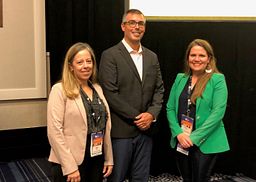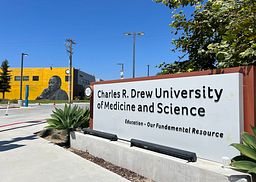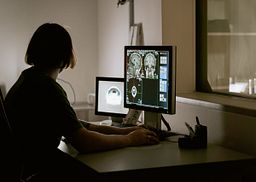FGRG Awardee Seeks to Transform Clinical Education

PAEA is pleased to announce that Shani Fleming, MSHS, MPH, PA-C, associate professor in the University of Maryland Baltimore PA program, executive member of the Physician Assistant Leadership and Learning Academy (PALLA) and graduate school chief equity, diversity, and inclusion officer, is the 2020–2021 PAEA Faculty-Generated Research Grant awardee. Fleming’s project is titled Building a Regional Center of Excellence for Optimizing Clinical Education: A Randomized-Controlled Crossover Study of an Innovative Telehealth Model for PA Programs (The BRITE Study). Gerald Kayingo, PhD, MBA, PA-C, assistant dean, professor, and executive director of PALLA, will serve as the senior researcher and mentor for the project alongside a team of other PA researchers and educators:
Each year, PAEA’s Faculty-Generated Research Grant Program awards an outstanding researcher with $50,000 in funding for an ambitious research project that has the potential to significantly expand the body of knowledge of PA education or the profession. Fleming’s proposal was selected after a rigorous, blinded review process, led by members of the PAEA Grants & Scholarship Review Committee. Research teams from all over the country submitted letters of intent, providing a brief overview of their proposed research projects. Following peer review, a select few were invited to submit a full proposal for a final review.
Fleming’s proposal was chosen because it offered a mixed-methods approach to addressing the significant administrative challenges and burdens of coordinating clinical training sites. The study aims to evaluate three research questions:
- Can a regional clinical coordinating center of excellence enhance the capacity and effectiveness of PA clinical training experiences?
- Are there differences in student performance on assessment metrics between traditional and telehealth clinical training experiences?
- What impact would a telehealth clinical training experience have on the diversity of preceptors and learning experiences?
The researchers will test these questions by building a Regional Telehealth Center of Excellence for clinical education, coordinating clinical site management among the four participating Maryland PA programs, and comparing traditional clinical experiences to telehealth experiences. “We are grateful for the award, which provided a perfect opportunity to illustrate the benefit of interprofessional teamwork, cognitive diversity, and transformative leadership,” Fleming said.
PA programs face a myriad of issues in the clinical education phase. The legal barriers, preceptor shortage, and the financial cost of paying training sites have led to intense competition. Disciplines such as pediatrics, women’s health, general surgery, and psychiatry are among the most difficult to acquire clinical rotations among PA students. Issues of encroachment and poaching of clinical sites have become common occurrences among programs. In addition, the proportion of PA programs that are now paying for some or all clinical training sites (48%) continues to rise, a trend that will likely worsen student debt and subsequently negatively impact workforce supply.
The team is investigating how regional collaborations and partnerships foster collaboration, pooling resources, and sharing of clinical sites among PA programs. “We will develop strategic partnerships with regional health systems and site-specific regional clinical coordinators targeting preceptors and clinical sites, emphasizing primary care, especially those clinical sites serving underserved populations,” Fleming said. Kayingo adds, “I am proud of the interdisciplinary nature of our team and the collaborative approach to the grant; these will be critical ingredients for the project’s success.”
Health care innovation has accelerated during the COVID-19 pandemic. Recent AAPA data from the PA practice survey has shown that approximately 64% of PAs were using telemedicine as of June 2020. In addition, the current limitations to traditional clinical training due to the COVID-19 have prompted the research team to evaluate the effectiveness of this kind of health care delivery on students during their training so that they are prepared to practice upon graduation.
Fleming and her colleagues hope that this collaborative platform in conjunction with insights on the feasibility and effectiveness of telehealth-enabled PA clinical training experiences will provide a model for best practices. “This initiative will enhance the program’s ability to monitor and evaluate student performance on clinical experience. Also, there is a high potential to reproduce this BRITE model nationally,” she said.
The PAEA Research Team congratulates Fleming and her co-investigators on their successful proposal. We look forward to seeing their results and how they influence PA education and the profession.
We also appreciate the time and effort that the Grants & Scholarship Review Committee and its chair, Trenton Honda, PhD, MMS, PA-C, committed to evaluating the proposals during the review and selection process.
For more information about the PAEA Faculty-Generated Research Grant visit the webpage or contact us at research@PAEAonline.org or 703-651-8540 to learn more about our other research resources and funding opportunities.











